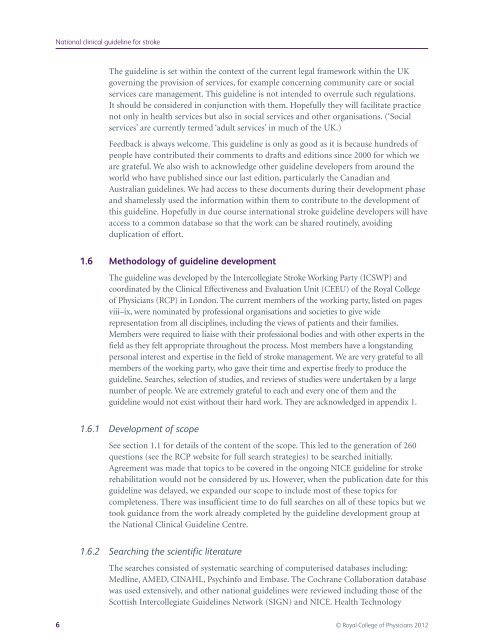national-clinical-guidelines-for-stroke-fourth-edition
national-clinical-guidelines-for-stroke-fourth-edition
national-clinical-guidelines-for-stroke-fourth-edition
You also want an ePaper? Increase the reach of your titles
YUMPU automatically turns print PDFs into web optimized ePapers that Google loves.
National <strong>clinical</strong> guideline <strong>for</strong> <strong>stroke</strong><br />
The guideline is set within the context of the current legal framework within the UK<br />
governing the provision of services, <strong>for</strong> example concerning community care or social<br />
services care management. This guideline is not intended to overrule such regulations.<br />
It should be considered in conjunction with them. Hopefully they will facilitate practice<br />
not only in health services but also in social services and other organisations. (‘Social<br />
services’ are currently termed ‘adult services’ in much of the UK.)<br />
Feedback is always welcome. This guideline is only as good as it is because hundreds of<br />
people have contributed their comments to drafts and <strong>edition</strong>s since 2000 <strong>for</strong> which we<br />
are grateful. We also wish to acknowledge other guideline developers from around the<br />
world who have published since our last <strong>edition</strong>, particularly the Canadian and<br />
Australian <strong>guidelines</strong>. We had access to these documents during their development phase<br />
and shamelessly used the in<strong>for</strong>mation within them to contribute to the development of<br />
this guideline. Hopefully in due course inter<strong>national</strong> <strong>stroke</strong> guideline developers will have<br />
access to a common database so that the work can be shared routinely, avoiding<br />
duplication of ef<strong>for</strong>t.<br />
1.6 Methodology of guideline development<br />
The guideline was developed by the Intercollegiate Stroke Working Party (ICSWP) and<br />
coordinated by the Clinical Effectiveness and Evaluation Unit (CEEU) of the Royal College<br />
of Physicians (RCP) in London. The current members of the working party, listed on pages<br />
viii–ix, were nominated by professional organisations and societies to give wide<br />
representation from all disciplines, including the views of patients and their families.<br />
Members were required to liaise with their professional bodies and with other experts in the<br />
field as they felt appropriate throughout the process. Most members have a longstanding<br />
personal interest and expertise in the field of <strong>stroke</strong> management. We are very grateful to all<br />
members of the working party, who gave their time and expertise freely to produce the<br />
guideline. Searches, selection of studies, and reviews of studies were undertaken by a large<br />
number of people. We are extremely grateful to each and every one of them and the<br />
guideline would not exist without their hard work. They are acknowledged in appendix 1.<br />
1.6.1 Development of scope<br />
See section 1.1 <strong>for</strong> details of the content of the scope. This led to the generation of 260<br />
questions (see the RCP website <strong>for</strong> full search strategies) to be searched initially.<br />
Agreement was made that topics to be covered in the ongoing NICE guideline <strong>for</strong> <strong>stroke</strong><br />
rehabilitation would not be considered by us. However, when the publication date <strong>for</strong> this<br />
guideline was delayed, we expanded our scope to include most of these topics <strong>for</strong><br />
completeness. There was insufficient time to do full searches on all of these topics but we<br />
took guidance from the work already completed by the guideline development group at<br />
the National Clinical Guideline Centre.<br />
1.6.2 Searching the scientific literature<br />
The searches consisted of systematic searching of computerised databases including:<br />
Medline, AMED, CINAHL, Psychinfo and Embase. The Cochrane Collaboration database<br />
was used extensively, and other <strong>national</strong> <strong>guidelines</strong> were reviewed including those of the<br />
Scottish Intercollegiate Guidelines Network (SIGN) and NICE. Health Technology<br />
6 © Royal College of Physicians 2012


